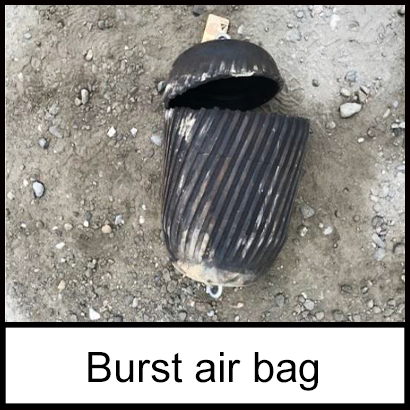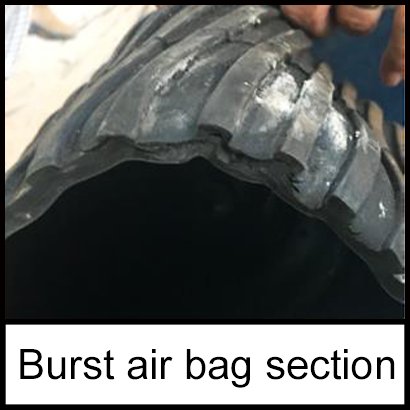-
What happened?
Workers were making a tie in weld on 16 inch terminal piping.
They planned to use dry ice plugs and nitrogen to inert the pipe, but the dry ice plugs were too big.
As atmospheric monitoring indicated the presence of gasoline vapour, they decided to use air bags as a vapour seal.
After several successful welds, one of the air bags had to be re-pressurised. Not knowing which one, both were re-pressurised.
One of the air bags then burst inside the pipe while the two workers were welding the final pass.
The operators stopped working and the work area was evacuated.

-
Why did it happen?
The line was locked out and drained, but not purged and pigged because the pipe was not configured for this.
This left behind residual gasoline.The type of air bag used was for pipe cleaning applications, not as a vapour barrier.
The dry ice plug could not be used as it was too big (it was 3 times the pipe diameter).
Work was not stopped when scope changed.
The team did not gain approval to use a vapour barrier.

-
What did they learn?
Air plugs must meet the relevant specifications for the work carried out.
Work should be stopped when a dangerous situation arises, but also when scope changes.
Changing scope of work should be approved by relevant personnel.
Monitor lower explosive limit gases in inert environments.
When working in inert atmospheres, understand how lower explosive limit readings can be affected.

-
Ask yourself or your crew
What other actions could have been taken?
Why do you think these people did what they did?
Would we ever be tempted to do something similar? Why?
How do we manage gas vapour when doing hot work?
What can we do differently today?

Add to homescreen
Content name
Select existing category:
Content name
New collection
Edit collection
What happened?
Workers were making a tie in weld on 16 inch terminal piping.
They planned to use dry ice plugs and nitrogen to inert the pipe, but the dry ice plugs were too big.
As atmospheric monitoring indicated the presence of gasoline vapour, they decided to use air bags as a vapour seal.
After several successful welds, one of the air bags had to be re-pressurised. Not knowing which one, both were re-pressurised.
One of the air bags then burst inside the pipe while the two workers were welding the final pass.
The operators stopped working and the work area was evacuated.

Why did it happen?
The line was locked out and drained, but not purged and pigged because the pipe was not configured for this.
This left behind residual gasoline.
The type of air bag used was for pipe cleaning applications, not as a vapour barrier.
The dry ice plug could not be used as it was too big (it was 3 times the pipe diameter).
Work was not stopped when scope changed.
The team did not gain approval to use a vapour barrier.

What did they learn?
Air plugs must meet the relevant specifications for the work carried out.
Work should be stopped when a dangerous situation arises, but also when scope changes.
Changing scope of work should be approved by relevant personnel.
Monitor lower explosive limit gases in inert environments.
When working in inert atmospheres, understand how lower explosive limit readings can be affected.
Ask yourself or your crew
What other actions could have been taken?
Why do you think these people did what they did?
Would we ever be tempted to do something similar? Why?
How do we manage gas vapour when doing hot work?
What can we do differently today?
Workers were making a tie in weld on 16 inch terminal piping. One of the air bags then burst inside the pipe while the two workers were welding the final pass.












